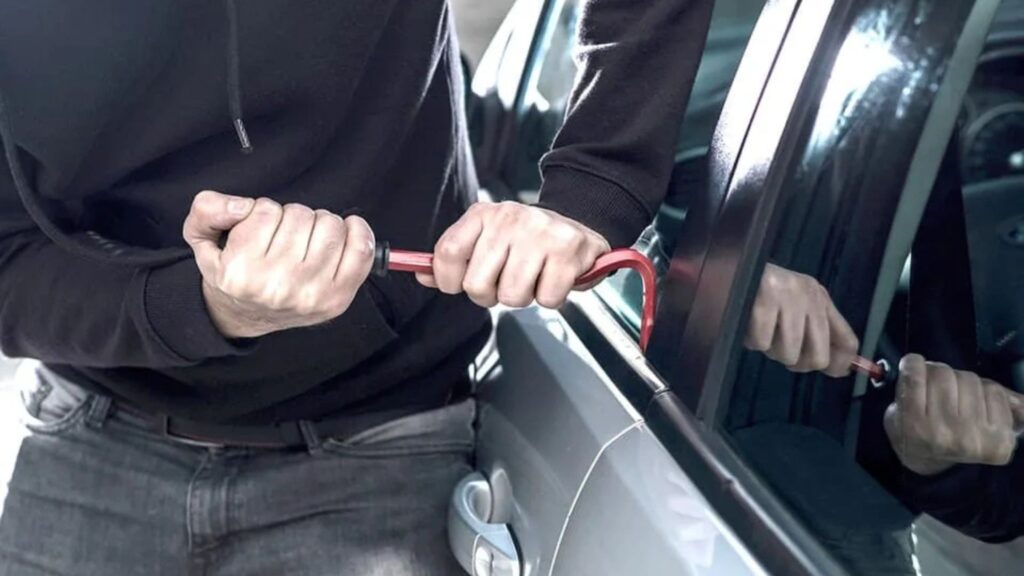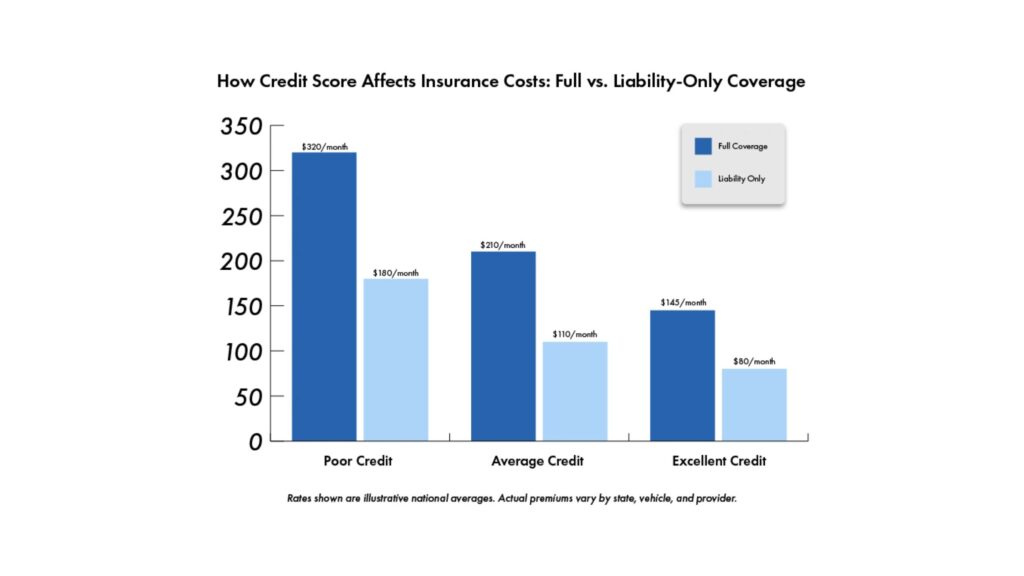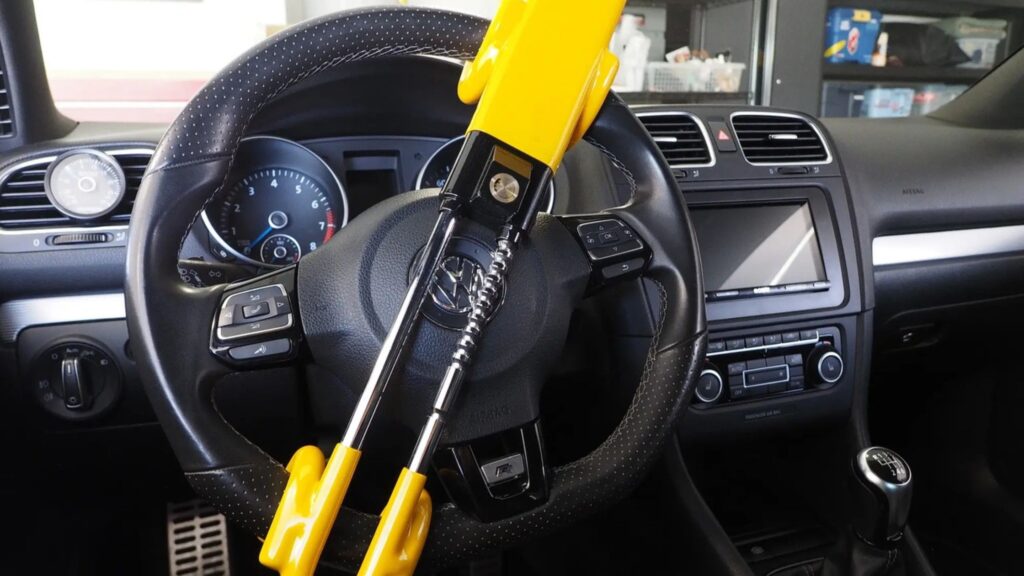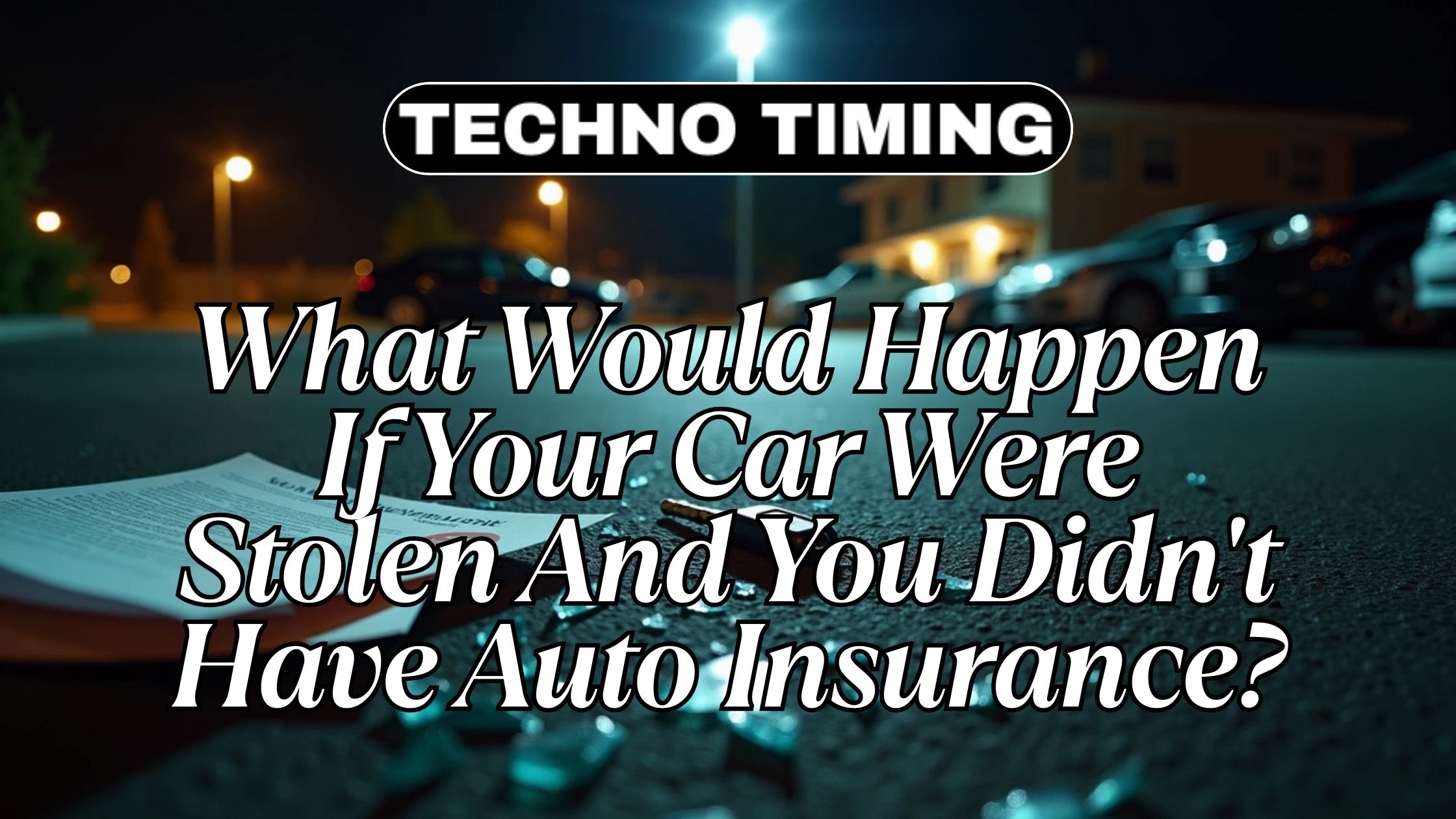What Happens If Your Car Gets Stolen Without Insurance?
No Insurance and Your Car Gets Stolen? Here’s What Really Happens! Having your car stolen with no insurance creates a financial nightmare few are prepared to face. In fact, the average stolen vehicle costs over $7,500 to replace—an expense that falls entirely on your shoulders when you lack coverage. Unfortunately, while 34% of stolen vehicles are recovered within 24 hours and 56% are eventually found, only 15% return undamaged, with 35% showing minor damage, 35% severely damaged or totaled, and 15% stripped for parts.
What happens when your car is stolen without insurance goes beyond just losing your vehicle. Without comprehensive coverage, you receive no help paying to replace your stolen car, while still being responsible for any outstanding loans. Additionally, you’ll spend $15-$50 daily on ride-sharing or $40-$100 on rental cars while scrambling to arrange replacement transportation. If your financed car is stolen with no insurance, you face the double burden of continued loan payments and finding money for a replacement vehicle.
In this article, we’ll walk through exactly what to do if your car is stolen without insurance, the legal obligations you can’t ignore, and how to protect yourself from future losses. Time matters—cars reported within two hours have 60% higher recovery rates than those reported after 12+ hours, so understanding these steps now could save you thousands later.
What happens when your car is stolen without insurance
The financial shock of a stolen car hits immediately when you lack insurance coverage. Unlike the temporary inconvenience insured drivers face, your situation presents lasting economic consequences that can affect your finances for years to come.
You get no reimbursement for the loss
When your car disappears and you have no comprehensive coverage, you face the harsh reality of receiving absolutely no financial compensation. Without proper insurance, you stand completely exposed to the full impact of the theft. Furthermore, if you only carry basic liability insurance, you’ll discover this provides zero protection against theft—liability only pays when you’re at fault in an accident that damages others or their property.
Despite the fact that most stolen vehicles are eventually recovered (56%), the condition is rarely favorable. Even if your car is found, you’ll likely face significant out-of-pocket costs since 35% of recovered vehicles have minor damage, another 35% are severely damaged or totaled, and 15% are stripped for parts. Consequently, you’re responsible for these repair expenses, which often exceed the vehicle’s value.
You must continue paying your car loan
Perhaps the most painful reality of having your financed car stolen without insurance is that your loan obligation doesn’t vanish with your vehicle. Your lender will continue expecting regular monthly payments regardless of the theft. This creates an especially distressing situation—you’re essentially paying for a car you can no longer use or access.
About 74% of lenders demand uninterrupted payments during the 30-45 day period following theft. This means you’ll shoulder both the outstanding loan balance and simultaneously need to find ways to replace your transportation, creating a significant financial burden that can quickly deplete savings and derail other financial goals.
You must pay for a replacement vehicle
Without insurance reimbursement, the entire cost of replacing your vehicle falls squarely on your shoulders. According to the National Insurance Crime Bureau, the average value of a stolen vehicle exceeds $7,500—a substantial sum that most Americans aren’t prepared to spend unexpectedly.
This financial pressure often forces uninsured theft victims to:
- Take out high-interest personal loans for replacement vehicles
- Purchase significantly cheaper, potentially less reliable cars
- Face potential credit score damage if debt accumulates
The replacement process creates a cascade of additional expenses beyond just the vehicle cost, including new taxes, registration fees, and documentation costs.
You must cover transportation costs
While figuring out how to replace your stolen vehicle, you still need to get around. Transportation alternatives create yet another layer of ongoing expenses:
Daily ride-sharing services typically cost between $15-$50, adding up to hundreds of dollars monthly. Alternatively, rental cars range from $40-$100 daily and often require substantial deposits. Even public transportation, though cheaper at approximately $50-$100 monthly in most areas, represents an additional expense when you’re already financially stretched.
These transportation costs accumulate rapidly, particularly when combined with continued loan payments on your stolen vehicle—creating what many describe as a “double financial burden” that can devastate your budget for months or even years.
Legal and reporting obligations you can’t ignore

When your vehicle disappears from its parking spot, legal obligations demand your immediate attention—even without insurance coverage. Beyond the financial burden, specific reporting requirements protect you from additional liability and improve your chances of vehicle recovery.
File a police report immediately
The clock starts ticking the moment you discover your car missing. Contact your local police department’s non-emergency line without delay, as cars reported stolen within the first 24 hours have a 34% same-day recovery rate. Moreover, vehicles reported within two hours have 60% higher recovery rates than those reported after 12+ hours.
When filing your police report, be prepared to provide:
- Vehicle make, model, year, and color
- License plate number and Vehicle Identification Number (VIN)
- Last known location and time you saw your vehicle
- Distinctive features, modifications, or identifying marks
- Personal belongings that were inside the car
Request a copy of the completed police report—this crucial document establishes an official record of the theft and serves as required documentation for subsequent steps.
Notify the DMV within 24–48 hours
Alongside police notification, reporting to your state’s Department of Motor Vehicles represents a mandatory step. Most states require DMV notification within 24-48 hours of discovering the theft. This critical step prevents you from being liable for violations or crimes committed with your stolen vehicle.
DMV reporting requirements vary by state:
- Some states require specific forms (like Nevada’s VP 202 for stolen plates)
- Oregon requires a Stolen Vehicle Notification within 60 days if uninsured
- Other states may require surrendering your vehicle registration if plates were stolen
Failing to properly notify your DMV could result in continued liability for traffic violations committed by thieves using your vehicle or plates.
Inform your lender about the theft
If your stolen vehicle has an outstanding loan or lease, contact your lender immediately. As the legal owner of the vehicle, your lender has a vested interest in its recovery and must be informed promptly.
Although your financing obligation continues regardless of the theft, informing your lender allows them to:
- Document the theft in their records
- Discuss potential options regarding payment arrangements
- Potentially expedite the claims process if insurance becomes involved
Naturally, without insurance coverage, your payment obligations typically continue uninterrupted. Failure to maintain payments can result in financial penalties, credit damage, and potential legal action from your lender.
Understand your state’s legal requirements
Legal obligations extend beyond initial reporting. Each state maintains specific requirements concerning vehicle theft. For instance, Missouri law requires police departments to make “immediate reports” to the state highway patrol for each vehicle reported stolen.
Additionally, operating without valid auto insurance is illegal in nearly every state. Even after a theft, this legal violation may trigger scrutiny once law enforcement becomes involved. Understanding these requirements helps you navigate the aftermath of theft without insurance.
Certainly, in states with mandatory insurance laws, you may face penalties for the lack of coverage alongside dealing with the theft. These can include fines, license suspension, or registration revocation—compounding an already difficult situation.
Remember that proper documentation and prompt reporting not only fulfill your legal obligations but also establish a critical paper trail should your vehicle be recovered or involved in subsequent incidents.
The hidden financial consequences of no insurance

Beyond the immediate shock of a stolen vehicle, the absence of insurance unleashes a cascade of financial consequences that can haunt victims for years. These hidden costs often surprise uninsured car theft victims who initially focus solely on the vehicle loss.
Loan default and credit score damage
Car theft victims without insurance face a devastating financial dilemma when loan payments become unmanageable. Missing car loan payments due to financial strain can severely impact your credit score, with a single missed payment potentially lowering your score by up to 110 points. Subsequently, if your debt goes to collections, you could experience legal action and additional credit damage.
First and foremost, defaulting on your car loan creates serious long-term consequences. A delinquency remains on your credit report for seven years from the date of the first missed payment. Ultimately, repossession (which can occur with loan default) leaves a serious derogatory mark on your credit report, slashing scores by 150-200 points and making future loans significantly more expensive.
Sadly, employment and housing applications may be rejected due to your damaged credit history, creating ripple effects throughout your financial life.
Out-of-pocket recovery and repair costs
Remarkably, most stolen vehicles are eventually found, yet recovery often brings additional expenses. Without insurance, you’re solely responsible for all recovery-related costs:
- Base impound fees averaging $250, with daily storage around $60 per day
- Towing charges from recovery location to impound adding $100-$300+
- Mechanical/structural damage repairs averaging $2,800+ (affecting 34% of recovered vehicles)
- Interior vandalism repairs ranging from $1,500-$3,000
Coupled with DMV re-registration fees, vehicle inspections, and legal documentation that can add hundreds more, these expenses quickly accumulate. Unfortunately, even when recovered, repair costs often exceed the vehicle’s value—expenses you’ll pay entirely out-of-pocket without comprehensive coverage.
Fines and penalties for lack of coverage
Ironically, the theft of your car doesn’t exempt you from legal insurance requirements. In many states, driving without insurance is illegal, potentially resulting in fines (approximately $500 in California), license suspension, registration penalties, and legal fees.
Notably, Florida requires continuous insurance coverage throughout the registration period, with no provisions for temporary or hardship licenses for insurance-related suspensions. Failure to maintain required coverage in Florida may result in driver’s license/registration suspension and reinstatement fees up to $500.
Of course, these penalties vary by state, with some governments even imprisoning people for driving without insurance. Second or third offenses typically carry heavier consequences, including higher fines and mandatory high-risk SR-22 filings. Above all, once flagged for a coverage lapse, insurance companies view you as higher-risk, leading to more expensive premiums when you eventually secure new coverage.
Can you be held liable for what the thief does?
Beyond financial burdens, car theft raises a troubling question: can you be legally responsible for accidents or crimes committed with your stolen car? The answer depends primarily on your actions before the theft occurred.
Negligence and owner responsibility
Typically, vehicle owners aren’t liable for damages caused by thieves. The majority rule across states holds that a stolen vehicle’s owner won’t be held responsible when the vehicle causes injury or property damage. This protection exists because the vehicle was taken without the owner’s consent, breaking the chain of causation between any potential negligence and resulting damage.
Nevertheless, exceptions arise when owners create foreseeable risks. If you leave keys in the ignition or your car unlocked in a high-crime area, you might face liability under negligent entrustment theory. Courts examine whether your actions made theft reasonably foreseeable – such as leaving a running vehicle unattended in an area with known theft history.
Comparative liability in some states
Interestingly, some states apply comparative negligence principles to car theft cases. Under this approach, courts assign a percentage of fault (1% to 100%) to vehicle owners who contributed to the theft through carelessness. Michigan courts, generally, have found liability when an owner’s employee left keys in a vehicle’s ignition outside a middle school, resulting in theft by minors who subsequently caused fatal accidents.
New Jersey similarly held a vehicle owner liable after she left keys inside her car in a parking lot with known theft history. The court determined the theft was a foreseeable consequence of her negligence, creating a duty to protect others from potential harm.
How a police report helps your defense
Filing a prompt police report provides crucial protection against liability claims. This official documentation establishes that your vehicle was taken without permission, fundamentally undermining claims that you permitted its use. Without this documentation, proving theft versus permissive use becomes exceedingly difficult.
Furthermore, many courts recognize that a properly documented theft breaks the chain of causation between any alleged negligence and resulting injuries. Documentation from law enforcement creates an official timeline, preventing claims that you somehow facilitated the thief’s actions.
Remember that reporting requirements vary by state. Whereas some jurisdictions require specific forms for stolen vehicles, others mandate reporting within strict timeframes. Failing to follow these procedures could weaken your liability defense, potentially leaving you vulnerable to claims from those injured by the thief.
How to protect yourself from future losses

After experiencing car theft without insurance, many vehicle owners realize the importance of proactive protection. Learning from this costly lesson often leads to better safeguards against future losses.
Why comprehensive coverage matters
Comprehensive coverage specifically protects against theft, paying your vehicle’s actual cash value if stolen. Surprisingly, this coverage costs only about $18 per month on average—a small investment compared to the thousands you’d lose without it. Unlike liability insurance, comprehensive coverage reimburses you even when your car disappears through no fault of your own.
How GAP insurance can help
GAP (Guaranteed Asset Protection) insurance covers the difference between what you owe on your car loan and your car’s actual value. Indeed, if your stolen $40,000 car has depreciated to $22,000 but you still owe $26,000, GAP insurance covers that $4,000 difference. This protection becomes crucial whenever your loan exceeds your car’s value.
Installing anti-theft devices
Vehicle immobilizers prevent thieves from bypassing your ignition system, ultimately becoming powerful deterrents. Visible devices like steering wheel locks create visual warnings, whereas tracking systems help law enforcement locate stolen vehicles. First, consider that many insurers offer up to 15% discount on comprehensive coverage for cars with anti-theft devices.
Shopping for affordable insurance
Insurance rates increased 21% year-over-year in 2024, hence making smart shopping essential. Ask about telematics programs, which can save drivers up to 30%. Furthermore, consider occupational discounts for public service positions like nursing or teaching.
Conclusion
Car theft without insurance creates a devastating financial reality few people prepare for. The absence of coverage means you pay for everything—from continued loan payments to replacement transportation—while receiving nothing to offset your stolen vehicle’s value. Time matters greatly when theft occurs, since prompt reporting dramatically increases recovery chances.
The aftermath extends far beyond just losing your car. Your credit score faces serious risk if you default on your auto loan, potentially affecting your financial standing for years to come. Additionally, many states impose penalties for driving without required insurance coverage, compounding your financial burden with fines and administrative fees.
Though the law generally protects vehicle owners from liability for a thief’s actions, this protection weakens if you demonstrate negligence, such as leaving keys in the ignition. A properly filed police report becomes your strongest defense against potential liability claims.
Looking forward, comprehensive coverage offers protection against theft for approximately $18 monthly—a small price compared to the thousands lost without it. GAP insurance provides another layer of security for financed vehicles, while anti-theft devices both deter criminals and potentially reduce your insurance premiums.
The painful lesson of car theft without insurance often teaches vehicle owners to prioritize proper coverage. Though comprehensive insurance seems like an optional expense when budgets tighten, the financial devastation of theft without coverage proves far costlier than any premium. Protecting yourself now saves not just money but also the immense stress that comes with navigating this unfortunate situation unprepared.
Key Takeaways
When your car is stolen without insurance, you face devastating financial consequences that extend far beyond just losing your vehicle. Here are the critical realities every driver should understand:
- You’re financially responsible for everything – No reimbursement for the stolen car, continued loan payments, replacement vehicle costs, and daily transportation expenses ($15-$50 for rideshares, $40-$100 for rentals)
- Report immediately to protect yourself – File police reports within 24 hours and notify DMV within 24-48 hours to avoid liability for crimes committed with your stolen vehicle and improve 60% higher recovery rates
- Credit damage can last seven years – Missing loan payments due to theft can drop credit scores by 110+ points, with defaults remaining on credit reports for seven years and affecting future loans, employment, and housing
- Comprehensive coverage costs only $18/month – This small investment protects against the average $7,500+ replacement cost of stolen vehicles, while GAP insurance covers loan balances exceeding vehicle value
- Legal liability exists if you’re negligent – Leaving keys in ignition or parking unlocked in high-crime areas can make you responsible for accidents caused by thieves, making proper documentation crucial for defense
The harsh reality is that comprehensive insurance seems expensive until you experience theft without it – then the premium looks like the bargain it truly is.
FAQs
Q1. What happens if my car is stolen and I don’t have insurance?
Without insurance, you’ll receive no reimbursement for the loss. You’ll need to continue making payments on any outstanding loan, cover the cost of a replacement vehicle, and pay for alternative transportation out of pocket. This can result in significant financial strain.
Q2. How soon should I report my car as stolen?
Report the theft to the police immediately. Cars reported stolen within the first 24 hours have a 34% same-day recovery rate. Additionally, notify your state’s Department of Motor Vehicles within 24-48 hours to avoid potential liability for violations committed with your stolen vehicle.
Q3. Can I be held responsible for accidents caused by the thief who stole my car?
Generally, vehicle owners aren’t liable for damages caused by thieves. However, if you were negligent (e.g., leaving keys in the ignition in a high-crime area), you might face liability. A promptly filed police report is crucial for protecting yourself against potential claims.
Q4. How does car theft without insurance affect my credit score?
If you default on your car loan due to theft, it can severely impact your credit score. A single missed payment can lower your score by up to 110 points, and the delinquency remains on your credit report for seven years, potentially affecting future loans and financial opportunities.
Q5. What steps can I take to protect myself from future car theft losses?
Consider investing in comprehensive coverage, which typically costs around $18 per month and protects against theft. Install anti-theft devices, which can deter thieves and may qualify you for insurance discounts. For financed vehicles, GAP insurance can cover the difference between your loan balance and the car’s value if stolen.
Also Read: Elon Musk Famous American Entrepreneur and Visionary


